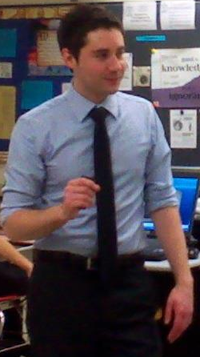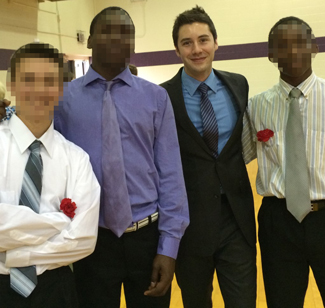January 17, 2023
 This is the fifth in a series of guest blogs by the 2022-23 Michigan Regional Teachers of the Year. Dustin Sayers is a social studies teacher at Schoolcraft Junior-Senior High School in Schoolcraft Community Schools.
This is the fifth in a series of guest blogs by the 2022-23 Michigan Regional Teachers of the Year. Dustin Sayers is a social studies teacher at Schoolcraft Junior-Senior High School in Schoolcraft Community Schools.
Dear Future Educators,
Now that I am in my 11th year of teaching, I find myself looking back at the decision that I made over a decade ago to enter the world of education, and I realize that the need for good teachers has never been greater.

When I started, teaching positions were difficult to find. Now, it seems that almost every district in the state has some unfulfilled openings. It's a great time to enter the profession, yet fewer and fewer individuals seem interested in taking on the role. So I write today to those considering education - to hopefully provide a glimpse into what teaching actually entails.
Teachers help provide children with purpose; we inspire and drive them to reach their full potential. It is arguably one of the most important roles of our society. However, if you are thinking about going into education to be out of work by 3 p.m. and have the summers off, then teaching is not for you. I can’t remember a summer where I didn’t work on something related to my classroom. I have attended professional developments, joined instructional conferences and worked my way through graduate school all so I could continue to renew my teaching license. I have spent my summer hours rewriting curriculum, creating power standards and even painting my classroom - all while working outside of contractual hours.
Helping students establish a love for learning is at the heart of what a teacher does each day. It’s extremely rewarding work, but it's also incredibly time-intensive. Teaching is a career that takes a tremendous amount of effort and patience. Even the days of guaranteed pensions and easily affordable medical benefits have since passed.
However, teaching is also one of the most altruistic and rewarding professions you could ever be a part of. My advice is simple. Examine what teaching really entails, and make sure that it is right for you. Education can be stressful, but the right teacher can change lives.
There are days where I struggle with the stresses of teaching, and you will experience them, too - from students with behavior issues to students whose family lives are unstable. In many situations, you may be the most secure and influential person in a child’s life. We cannot fix all the socioeconomic disadvantages in the world, but if you use the hardships as a learning experience, you will better yourself in the long run. I do not mention these things to scare you off; they are simply the reality of teaching. When you experience struggles, trust yourself and remember why you thought about getting into education in the first place.
Ultimately, teaching requires patience - patience with yourself, but especially patience for the kids. Everyone learns differently, and not always at the same pace. When you make your curriculum more flexible, you have a better opportunity for growth.
This does not mean that you should not challenge every student. It simply means that you need to challenge every student at their level. Learn how to differentiate your instruction before you ever set foot into a classroom. Stations and rotational teaching are not just for elementary students. Group students based on ability and create individualized mini lessons to build their skill deficits. Don’t be afraid to be creative and try new things. My most memorable lessons are the ones where my students get to be active.

Most importantly, get to know your students! They may not tell you this in teacher prep, but classroom management is probably your first role. When you get your own room, you may feel pressured to start teaching your content right away, but you need to fight this urge. Establish your procedures, rules and routines early, and learn the kids’ names!
Let the students get to know you and work through team building exercises. There are a lot of content expectations for every subject, but forging connections and teaching life skills are vastly more important. Your first week, or two, should be about relationship building, class structure and emphasizing how your class provides life skills.
Remember, students will try so much harder if they know you are there to truly support them. Get to know them and let them get to know you. Teaching can be stressful, but a great teacher can make all the difference.
Educationally yours,
Dustin Sayers